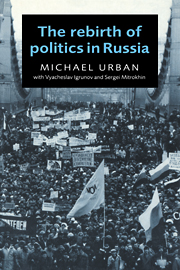Book contents
- Frontmatter
- Contents
- Preface
- Part I The pre-political context
- 1 Politics and communism: figure and ground
- 2 Regime and opposition in the pre-political period
- Part II Perestroika and the return of political life
- Part III Politics and revolution
- Part IV Ground up: politics in post-communist Russia
- Notes
- Index
2 - Regime and opposition in the pre-political period
Published online by Cambridge University Press: 22 October 2009
- Frontmatter
- Contents
- Preface
- Part I The pre-political context
- 1 Politics and communism: figure and ground
- 2 Regime and opposition in the pre-political period
- Part II Perestroika and the return of political life
- Part III Politics and revolution
- Part IV Ground up: politics in post-communist Russia
- Notes
- Index
Summary
This chapter surveys a period that we call ‘pre-political’. It can be likened to those intervals – pre-dawn or twilight – that separate night from day, intervals during which neither is quite present yet both seem to be there at once, incongruously, cancelling one another out at the same time. Pre-political suggests such an interval to us. It describes a period that is neither political in the sense of that term as we have used it, nor altogether anti-political as we have characterized communism. What defines the interval in this way would be the appearance and development of a small but none the less significant social movement that came to be known as ‘the dissidents’. The presence of this novel element on the inhospitable terrain of state socialism represents a critical turning point for our subject, for it introduces a new and unique position into the field of cultural-political expression that reverberates as a series of reactions and permutations on the part of other actors. Moreover, the discursive practices associated with this movement would both anticipate a return of political life in Russia and contribute at least indirectly to that return itself.
Short exegeses of certain theoretic concepts, introduced to organize the discussion and to provide an inter-related set of categories for its principal elements, punctuate this chapter. One of these concepts – ‘cultural–political field’ – can be briefly introduced, here, by noting three aspects of its use pertinent to our discussion. First, the compound adjective is employed to connote politically related practices that have their origins in the sphere of cultural production.
- Type
- Chapter
- Information
- The Rebirth of Politics in Russia , pp. 28 - 52Publisher: Cambridge University PressPrint publication year: 1997
- 1
- Cited by



